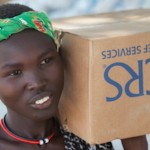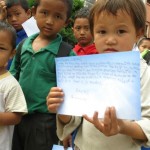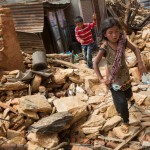We’ve watched on television as news of Ebola has reached our shores over the past few weeks. I can’t help but think that for some of us, it took an outbreak here in our country to wake us up to those who are suffering from this crippling health crisis around the world. When I learned this week that Catholic Relief Services’ Regional Information Officer Michael Stulman was en route to Sierra Leone and Liberia, I reached out for a quick interview. As I posed my questions to Michael, playing in the back of my mind was the memory of a visit to a health clinic I’d made with a friend last year during my trip to Rwanda. Even though the Rwandan staff was amazingly efficient and friendly, I saw firsthand how differently health care is delivered in that country from what we experience here at home. By following Michael on Twitter this week, I’ve had a great vantage point to see what CRS is doing to help those who are dealing with Ebola — both in educating them and in treating them with beautiful dignity and respect. Our donations to donate.crs.org/ebolacrisis can help with their ongoing education and support initiatives to aid in the stemming of this deadly virus.
Please read this brief interview with Michael, join me in praying for his safety and that of CRS and the families they serve, and consider a modest donation to donate.crs.org/ebolacrisis. Our sacrifices here can make a true difference in eradicating Ebola worldwide.
Tweets from Michael Stulman:
At this burial site I visited in Freetown, workers said they are digging more than 40 graves per day pic.twitter.com/lWWXkPiua1
— Michael Stulman (@MichaelStulman) October 21, 2014
In Sierra Leone, schools are closed. Teachers aren’t at work. Students aren’t learning in the classroom. pic.twitter.com/P7D52kVt2Q — Michael Stulman (@MichaelStulman) October 21, 2014
@iamCARITAS members @trocaire @CAFOD @CatholicRelief supporting Ebola prevention work in Sierra Leone. pic.twitter.com/b2Qp2uGs5s
— Caritas (@iamCARITAS) October 21, 2014
CRS is helping construct an #Ebola screening site in #SierraLeone, so patients can receive safe access to care. pic.twitter.com/c9yooOQ3vB — Michael Stulman (@MichaelStulman) October 22, 2014

Q: Please briefly introduce yourself to our readers.
My name is Michael Stulman. I was born and raised in Ohio, and I’m passionate about social justice and sustainable development in Africa. I moved from Washington, DC to Dakar, Senegal in 2013.
Q: Tell us about your role with Catholic Relief Services.
Catholic Relief Services is the official international humanitarian agency of the Catholic community in the United States. As Regional Information Officer for West and Central Africa, I document our work across more than 20 countries in the region. It’s a fantastic job, and I’m privileged to have the opportunity to speak to those people who have benefited from our work at a grassroots level.
Q: As you respond to these questions, you are on the ground in Sierra Leone and en route to Liberia. Please let us know about the focus of your trip and what you’re hoping to accomplish.
My goal is to meet with key stakeholders that are responding to the Ebola outbreak and understand the successes and challenges of their efforts. This includes members of the Catholic Church, our local staff on the ground and in the frontlines, as well as ordinary people from around the region that have been affected by the Ebola outbreak. I want to help share their story with a wider audience.
Q: Because I’m a mom, I have to ask — did you feel any sense of personal concern about traveling to these areas of the world in light of the current concerns over Ebola? What types of precautions have you taken to protect your health and safety?
Staff safety and security is a priority concern for CRS in any emergency situation. In this context, prior to my trip, I participated in a detailed briefing about Ebola, how it spreads, and what actions I need to take to protect myself while traveling. Our teams are monitoring the situation on a daily basis, and they understand and provided input on what would be safe during my visit. It’s helpful that we have staff in all the affected countries, so they can provide constant guidance and advice while I’m on the ground.
Since becoming infected with Ebola requires direct, physical contact with the bodily fluids of people who have been infected with or died from Ebola, the number one rule while traveling in an affected country is “do not touch!” … anyone!
Q: How can our readers support the work of CRS in the realm of Ebola aid and prevention?
To learn more about how CRS is responding to Ebola, and support our work, please visit: donate.crs.org/ebolacrisis
Q: Are there any additional thoughts you would like to share with our readers?
As I’m traveling in Sierra Leone and Liberia, readers can follow my updates on Twitter at @MichaelStulman, and follow @CatholicRelief for more information on our programs worldwide.
- Learn more about CRS’ work in this region here, where Jennifer Poidatz, director of Humanitarian Response shares about her recent travels to Liberia
- Donate to donate.crs.org/ebolacrisis
Copyright 2014 Lisa M. Hendey
















